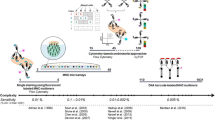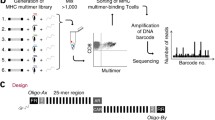Abstract
Peptide-major histocompatibility complex class II (pMHCII) multimers have emerged as a convenient and powerful tool for characterization of CD4 T cell immune responses in a large variety of human diseases. Peptide-MHCII multimers can rapidly identify peptide antigens recognized by CD4 T cells via high-throughput peptide screening procedures. The specificity and phenotype of antigen-specific CD4 T cells can be effectively visualized by pMHCII multimers from unmanipulated immune cell populations. Functional attributes of antigen-specific CD4 T cells can also be defined with the multimer technology in combination with immune functional assays such as intracellular cytokine staining (ICS).
Access this chapter
Tax calculation will be finalised at checkout
Purchases are for personal use only
Similar content being viewed by others
References
Steinitz KN, van Helden PM, Binder B et al (2012) CD4+ T-cell epitopes associated with antibody responses after intravenously and subcutaneously applied human FVIII in humanized hemophilic E17 HLA-DRB1*1501 mice. Blood 119(17):4073–4082. https://doi.org/10.1182/blood-2011-08-374645
Mannering SI, Morris JS, Jensen KP et al (2003) A sensitive method for detecting proliferation of rare autoantigen-specific human T cells. J Immunol Methods 283(1–2):173–183. https://doi.org/10.1016/j.jim.2003.09.004
Novak EJ, Liu AW, Gebe JA et al (2001) Tetramer-guided epitope mapping: rapid identification and characterization of immunodominant CD4+ T cell epitopes from complex antigens. J Immunol 166(11):6665–6670
Chow IT, Yang J, Gates TJ, Jet a (2014) Assessment of CD4+ T cell responses to glutamic acid decarboxylase 65 using DQ8 tetramers reveals a pathogenic role of GAD65 121-140 and GAD65 250-266 in T1D development. PLoS One 9(11):e112882. https://doi.org/10.1371/journal.pone.0112882
Marre ML, McGinty JW, Chow IT et al (2018) Modifying enzymes are elicited by ER stress, generating epitopes that are selectively recognized by CD4(+) T cells in patients with type 1 diabetes. Diabetes 67(7):1356–1368. https://doi.org/10.2337/db17-1166
Chow IT, Gates TJ, Papadopoulos GK et al (2019) Discriminative T cell recognition of cross-reactive islet-antigens is associated with HLA-DQ8 transdimer-mediated autoimmune diabetes. Sci Adv 5(8):eaaw9336. https://doi.org/10.1126/sciadv.aaw9336
James EA, Rieck M, Pieper J, Get a (2014) Citrulline-specific Th1 cells are increased in rheumatoid arthritis and their frequency is influenced by disease duration and therapy. Arthritis Rheumatol 66(7):1712–1722. https://doi.org/10.1002/art.38637
Rims C, Uchtenhagen H, Kaplan MJ et al (2019) Citrullinated Aggrecan epitopes as targets of autoreactive CD4+ T cells in patients with rheumatoid arthritis. Arthritis Rheumatol 71(4):518–528. https://doi.org/10.1002/art.40768
Raddassi K, Kent SC, Yang J et al (2011) Increased frequencies of myelin oligodendrocyte glycoprotein/MHC class II-binding CD4 cells in patients with multiple sclerosis. J Immunol 187(2):1039–1046. https://doi.org/10.4049/jimmunol.1001543
Cao Y, Goods BA, Raddassi K et al (2015) Functional inflammatory profiles distinguish myelin-reactive T cells from patients with multiple sclerosis. Sci Transl Med 7(287):287ra274. https://doi.org/10.1126/scitranslmed.aaa8038
Uchtenhagen H, Rims C, Blahnik G, Cet a (2016) Efficient ex vivo analysis of CD4+ T-cell responses using combinatorial HLA class II tetramer staining. Nat Commun 7:12614. https://doi.org/10.1038/ncomms12614
Batard P, Peterson DA et al (2006) Dextramers: new generation of fluorescent MHC class I/peptide multimers for visualization of antigen-specific CD8+ T cells. J Immunol Methods 310(1–2):136–148. https://doi.org/10.1016/j.jim.2006.01.006
Huang J, Zeng X, Sigal N et al (2016) Detection, phenotyping, and quantification of antigen-specific T cells using a peptide-MHC dodecamer. Proc Natl Acad Sci U S A 113(13):E1890–E1897. https://doi.org/10.1073/pnas.1602488113
Lissina A, Ladell K, Skowera A et al (2009) Protein kinase inhibitors substantially improve the physical detection of T-cells with peptide-MHC tetramers. J Immunol Methods 340(1):11–24. https://doi.org/10.1016/j.jim.2008.09.014
Acknowledgments
Supported by US National Institutes of Health NIDDK grant DP3DK106909.
Author information
Authors and Affiliations
Corresponding author
Editor information
Editors and Affiliations
Rights and permissions
Copyright information
© 2021 Springer Science+Business Media, LLC, part of Springer Nature
About this protocol
Cite this protocol
Chow, IT., Kwok, W.W. (2021). Identification of Human Antigen-Specific CD4+ Cells with Peptide-MHC Multimer Technologies. In: Annunziato, F., Maggi, L., Mazzoni, A. (eds) T-Helper Cells. Methods in Molecular Biology, vol 2285. Humana, New York, NY. https://doi.org/10.1007/978-1-0716-1311-5_13
Download citation
DOI: https://doi.org/10.1007/978-1-0716-1311-5_13
Published:
Publisher Name: Humana, New York, NY
Print ISBN: 978-1-0716-1310-8
Online ISBN: 978-1-0716-1311-5
eBook Packages: Springer Protocols




